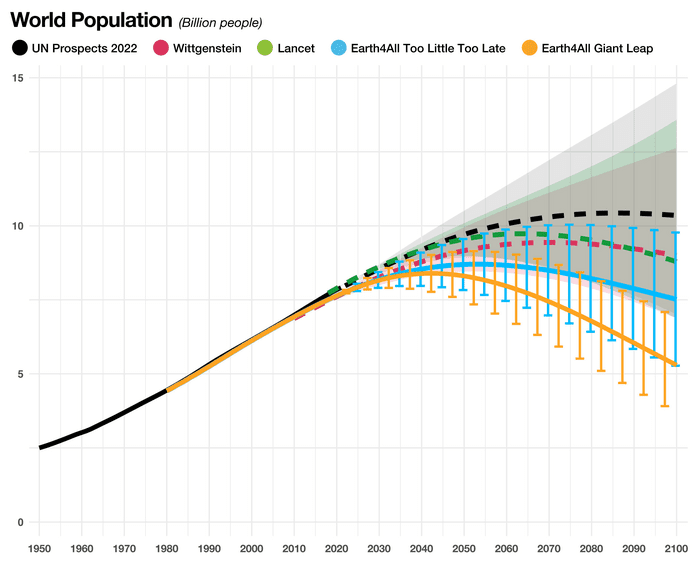A new estimate suggests that the world’s population will likely peak in the next few decades and will decline significantly by the end of the century, perhaps slumping as low as 6 billion people. If the work is correct, this will be the first time the global population has seen a decline since the Black Death in the mid-14th century.
The world’s population recently tipped over 8 billion. In their latest working paper, researchers underline two hypothetical scenarios that explain how the next chapter of global population change might pan out.
Under the “Giant Leap” scenario, significant improvement in economic development, education, and health will see the population peak at 8.5 billion people around 2040 before declining to around 6 billion people by 2100.
Alternatively, under the “Too Little Too Late” scenario, the world continues to develop economically in a similar way to the last 50 years, resulting in the global population peaking at 8.6 in 2050 and then declining to 7 billion in 2100.
The report comes from the Club of Rome, a collective of intellectuals who are well-known for their controversial 1972 publication “Limits to Growth.” Using computer models, they speculated that civilization will be threatened with collapse if it continues to undergo exponential economic and population growth with a finite supply of resources.
Their new estimate – called the Earth4All model – is substantially lower than other population estimates, including those of the United Nations and another influential paper published in the Lancet in 2020 (see graph below).

Comparing five population scenarios to 2100 (United Nations, Wittgenstein, Lancet, Earth4All – Too Little Too Late, Earth4All – Giant Leap). Image credit: Callegari B., Stoknes P.E., People and Planet: 21st century sustainable population scenarios and possible living standards within planetary boundaries.
The estimates ultimately hinge on how many people are lifted out of poverty, which they see as a vital factor in global population change.
Significant parts of the world, notably certain nations in Africa and Asia, are currently experiencing rapid population growth. When and how this tapers off, they argue, depends on how they grapple with economic development. If wealth is disturbed fairly and economic growth is widely benefited, then we can expect these populations to peak sooner rather than later.
“We know rapid economic development in low-income countries has a huge impact on fertility rates. Fertility rates fall as girls get access to education and women are economically empowered and have access to better healthcare,” Per Espen Stoknes, Earth4All project lead and director of the Centre for Sustainability at Norwegian Business School, said in a statement.
As well as looking at factors like women’s education and access to contraception, they also take into account the disruption of natural resources, food production, and the use/abuse of the environment.
Crucially, they are keen to highlight that global well-being isn’t held back by the number of people on the planet; overpopulation isn’t the issue. Instead, it’s the sky-high material footprint levels among the world’s richest 10 percent that threaten to destabilize the planet.
“Humanity’s main problem is luxury carbon and biosphere consumption, not population. The places where population is rising fastest have extremely small environmental footprints per person compared with the places that reached peak population many decades ago.” added Jorgen Randers, one of leading modelers for Earth4All and co-author of The Limits to Growth.
“A good life for all is only possible if the extreme resource use of the wealthy elite is reduced,” concludes Randers.
The full report and summary can be read here [PDF].
Source Link: Global Population May Tumble To Just 6 Billion People By 2100